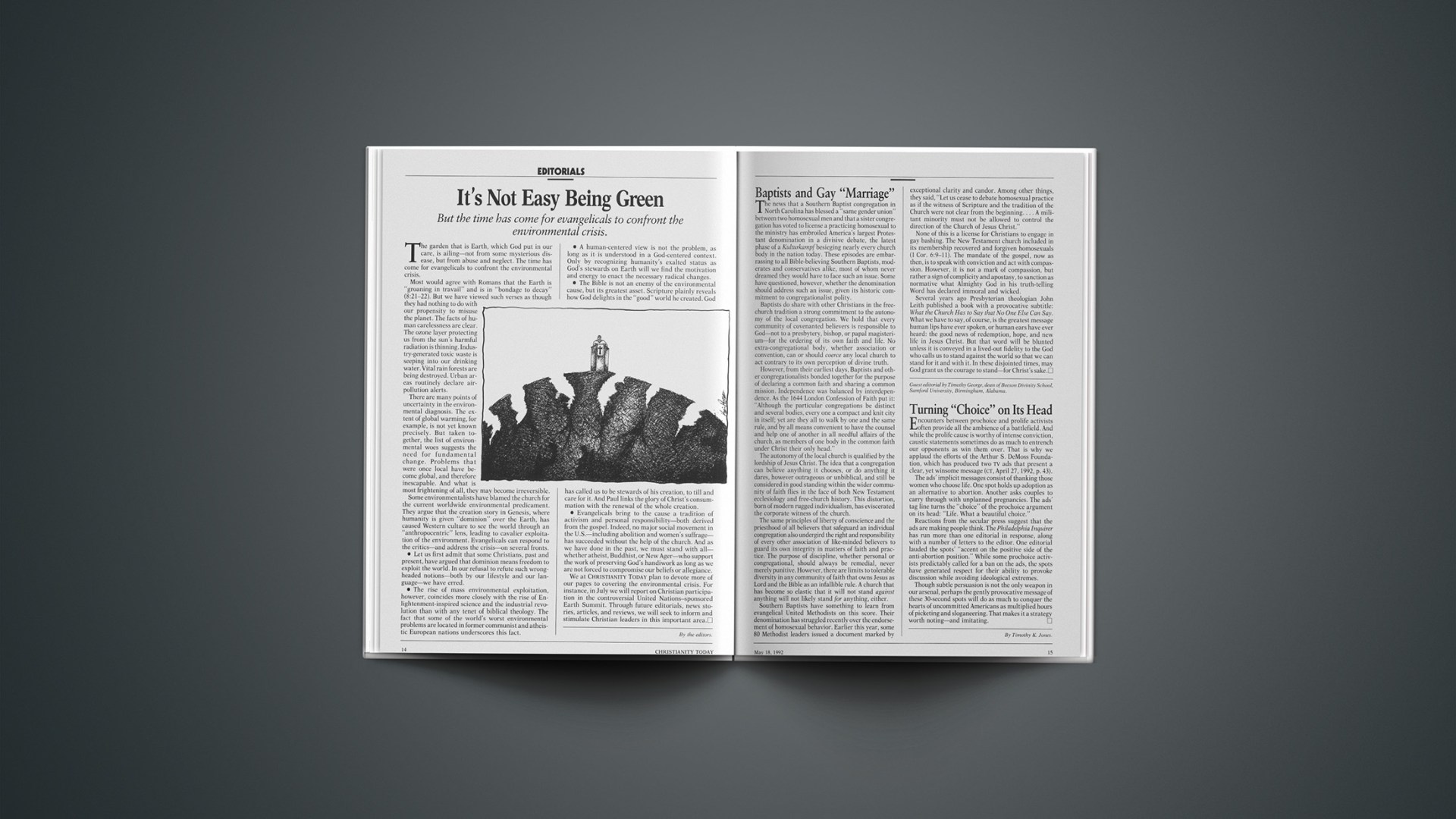The news that a Southern Baptist congregation in North Carolina has blessed a “same gender union” between two homosexual men and that a sister congregation has voted to license a practicing homosexual to the ministry has embroiled America’s largest Protestant denomination in a divisive debate, the latest phase of a Kulturkampf besieging nearly every church body in the nation today. These episodes are embarrassing to all Bible-believing Southern Baptists, moderates and conservatives alike, most of whom never dreamed they would have to face such an issue. Some have questioned, however, whether the denomination should address such an issue, given its historic commitment to congregationalist polity.
Baptists do share with other Christians in the free-church tradition a strong commitment to the autonomy of the local congregation. We hold that every community of covenanted believers is responsible to God—not to a presbytery, bishop, or papal magisterium—for the ordering of its own faith and life. No extra-congregational body, whether association or convention, can or should coerce any local church to act contrary to its own perception of divine truth.
However, from their earliest days, Baptists and other congregationalists bonded together for the purpose of declaring a common faith and sharing a common mission. Independence was balanced by interdependence. As the 1644 London Confession of Faith put it: “Although the particular congregations be distinct and several bodies, every one a compact and knit city in itself; yet are they all to walk by one and the same rule, and by all means convenient to have the counsel and help one of another in all needful affairs of the church, as members of one body in the common faith under Christ their only head.”
The autonomy of the local church is qualified by the lordship of Jesus Christ. The idea that a congregation can believe anything it chooses, or do anything it dares, however outrageous or unbiblical, and still be considered in good standing within the wider community of faith flies in the face of both New Testament ecclesiology and free-church history. This distortion, born of modern rugged individualism, has eviscerated the corporate witness of the church.
The same principles of liberty of conscience and the priesthood of all believers that safeguard an individual congregation also undergird the right and responsibility of every other association of like-minded believers to guard its own integrity in matters of faith and practice. The purpose of discipline, whether personal or congregational, should always be remedial, never merely punitive. However, there are limits to tolerable diversity in any community of faith that owns Jesus as Lord and the Bible as an infallible rule. A church that has become so elastic that it will not stand against anything will not likely stand for anything, either.
Southern Baptists have something to learn from evangelical United Methodists on this score. Their denomination has struggled recently over the endorsement of homosexual behavior. Earlier this year, some 80 Methodist leaders issued a document marked by exceptional clarity and candor. Among other things, they said, “Let us cease to debate homosexual practice as if the witness of Scripture and the tradition of the Church were not clear from the beginning.… A militant minority must not be allowed to control the direction of the Church of Jesus Christ.”
None of this is a license for Christians to engage in gay bashing. The New Testament church included in its membership recovered and forgiven homosexuals (1 Cor. 6:9–11). The mandate of the gospel, now as then, is to speak with conviction and act with compassion. However, it is not a mark of compassion, but rather a sign of complicity and apostasy, to sanction as normative what Almighty God in his truth-telling Word has declared immoral and wicked.
Several years ago Presbyterian theologian John Leith published a book with a provocative subtitle: What the Church Has to Say that No One Else Can Say. What we have to say, of course, is the greatest message human lips have ever spoken, or human ears have ever heard: the good news of redemption, hope, and new life in Jesus Christ. But that word will be blunted unless it is conveyed in a lived-out fidelity to the God who calls us to stand against the world so that we can stand for it and with it. In these disjointed times, may God grant us the courage to stand—for Christ’s sake.
Guest editorial by Timothy George, dean of Beeson Divinity School, Samford University, Birmingham, Alabama.










